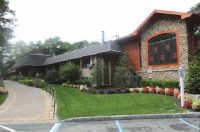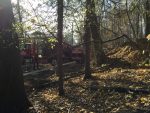Distrust Runs Deep Throughout Sunshine Children’s Home Review

When several neighboring homeowners of the Sunshine Children’s Home & Rehabilitation Center woke up the day after Thanksgiving in 2017, they noticed unusual site disturbance on a portion of the 33-acre Spring Valley Road property.
Heavy equipment had been brought onto the land and from a distance there appeared to be excavation and tree clearing.
Up until then, most of the issues had largely played out during robust and often testy debate before the Zoning Board of Appeals or the Planning Board relating to environmental issues or technical zoning matters.
“They dug up a whole hillside, and the steep slope of that hillside is now all dug up and then they cut down some trees,” nearby resident David Whitlinger told The Examiner shortly after the incident.
What happened, according to attorney Mark Weingarten, who has represented Sunshine during what is now a four-year process, is that maintenance was required on Well 1, one of the property’s three wells, an activity that is permitted. Sunshine had hired a contractor who needed to remove the shed over the well to complete the work.
However, upon arriving at the scene, the contractor noticed a tree had grown through the shed, Weingarten said. Instead of contacting someone about how he should proceed, the tree was mistakenly removed, he said.
That controversy widened an already deep rift between the neighbors and the Sunshine Children’s Home, and for some, the Town of New Castle. The town’s Building Department investigated but less than two months later retroactive permits were issued, prompting some residents to question whether the town was abdicating its responsibility of properly overseeing the project.
Glendale Road resident Cynthia Manocherian, part of a group of litigants that is currently embroiled in three different court actions, said that Sunshine’s lack of transparency has been evident since 2015, when the applicant first appeared before the ZBA seeking permission to expand from 54 to 122 beds. The facility will grow from under 19,000 square feet to about 143,000 square feet once the expansion is completed.
It was several months into the review before residents on the far western edge of the town and others who live on the Ossining side of the border learned what was being proposed, Manocherian said. Had it not been for the neighbors’ vigilance and persistence on several issues there would have been far less scrutiny than there has been, she maintained.
“There’s a long list of moments that didn’t feel right and these moments are not created by the residents,” Manocherian said. “They are created by the process that Sunshine has undertaken.”
During the Mar. 6 informational meeting on off-site well testing, William Canavan, the hydrogeologist hired by the town, complimented the neighbors for their diligence on the water issue.
“Before your group got involved, started scrutinizing this and you had your hydrogeologist and your attorney and before I got involved, from where they were then and where they are now is light years ahead of what they were doing and what they’re required to do now,” he said.
Site Work and Blasting
Tense moments have continued to surface since Sunshine’s approvals last May. Three times the neighbors have filed an Article 78 in state Supreme Court contesting some aspect of the project.
This winter, temporary fencing on the property’s perimeter was erected and site work commenced. The first task was to widen the driveway. Manocherian’s lawyer, Adam Stolorow, charged that the phasing protocols were ignored because more than five acres cannot be disturbed during Phase I, which included driveway widening and tree clearing.
Weingarten dismissed that claim, saying only 3.8 acres were disturbed.

Suspicions were also raised that Sunshine may be trying to engage in prohibited Sunday site work. Neighbors alerted town officials early on Mar. 3 when a construction vehicle had turned into Sunshine’s driveway.
Weingarten said it was an unidentified truck that entered and left the property and had nothing to do with his client.
Another issue is blasting, which is tentatively scheduled to be done in late April or May. More skepticism abounded after a recent routine and required pre-blast survey was circulated to neighbors that would allow MD Drilling & Blasting, the company that will do the work, to confirm prior conditions of neighbors’ homes beforehand, Weingarten said.
“There are people out there that are seriously afraid because of the things they are hearing from their neighbors,” Weingarten said. “We are very sorry about that. We are sympathetic to these people. We’re trying to get the facts out now, that it isn’t what’s being presented. These people have this agenda against this home.”
Manocherian has criticized Sunshine for planning on continued operation of the facility while blasting and construction is scheduled. Last week, she also called on the town to exercise any authority it may have on the issue, saying that the children shouldn’t be subjected to the conditions at the site, putting their health and welfare at risk.
Town Attorney Nicholas Ward-Willis said the town has no jurisdiction over that matter.
Weingarten said his client has hired one of the world’s largest construction firms, Turner Construction, to build the addition, ensuring a high level of sound judgment and expertise.
Litigation
In 2016, the first Article 78 was filed by a group of about eight residents challenging the negative declaration issued by the ZBA, meaning the project would cause no significant adverse environmental impacts. The Manocherians also filed suit but those two actions were later combined.
State Supreme Court Justice Paul Marx ruled that the neighbors’ arguments were meritless but that is under appeal in the Appellate Division, Second Department.
Since last spring’s permit approvals, two more suits have been initiated. One was against the Planning Board, which granted wetlands, steep slopes, tree removal and stormwater prevention plan permits to Sunshine. The petitioners are also appealing a decision that went against them.
Weingarten called the third Article 78 “the height of hypocrisy” on the part of the neighbors. A request to slightly shift the addition so it’s not as close to Manocherian’s property as well as reducing the size of the building and retaining wall, was agreed to by Planning Board and ZBA. That wasn’t enough to stop more litigation.
“It’s unbelievable that they’ve taken this position,” Weingarten said. “The Zoning Board on their request made a change. I’ve never seen it in my lifetime. It’s the height of hypocrisy because what it proves is they want to do anything they can to make Sunshine spend as much money and delay things as much as possible because they’re trying to harm the home.
“They are acting like bullies and I am proud of the fact that we are standing up to the bullies.”
Stolorow immediately rejected that explanation of the sum and substance of the latest Article 78. He said it related to the deepening of Well 1, which took place during the Thanksgiving 2017 weekend activity.
“That lawsuit challenges the conclusion of the town that the Well 1 deepening has nothing to do with the rest of the project,” Stolorow said.
Had it been correctly identified as part of the project, then Sunshine would have had to redo the site plan and receive new approvals on the permits granted by the Planning Board, he said.
A decision on the third Article 78 is still pending.
No Truce in Sight
For Weingarten, the tactics used by project opponents – including suggestions that Marx, a former litigation partner with the DelBello, Donnellan, Weingarten, Wise & Wiederkehr law firm that represents Sunshine would not rule against his former law practice in the first Article 78 – are “reprehensible.”
He said in all the controversial projects he has represented in Westchester over the years, this one has been the most contentious.
“It is shameful behavior,” he said. “I don’t know how the Manocherians sleep at night. I’ve told them and their attorney that on numerous occasions. They should be ashamed of themselves.”
Manocherian pushed back against suggestions that she and her neighbors are NIMBYs. There are now about two dozen litigants and they will continue to fight, she said.
There was also a reason why the town had required this type of facility be on a state or county road, which necessitated the special permit. There is concern among the neighbors not only for their own properties but for the safety of the medically fragile children during and after construction.
“You don’t care about them during construction? You don’t care about them after construction, with your wood-frame building and you do not have the water resources in case of a fire” Manocherian asked. “The truth of the matter is things happen on construction sites all the time. They just do.
“I ask how he (Weingarten) sleeps at night and how the developer sleeps at night.”

Martin has more than 30 years experience covering local news in Westchester and Putnam counties, including a frequent focus on zoning and planning issues. He has been editor-in-chief of The Examiner since its inception in 2007. Read more from Martin’s editor-author bio here. Read Martin’s archived work here: https://www.theexaminernews.com/author/martin-wilbur2007/
